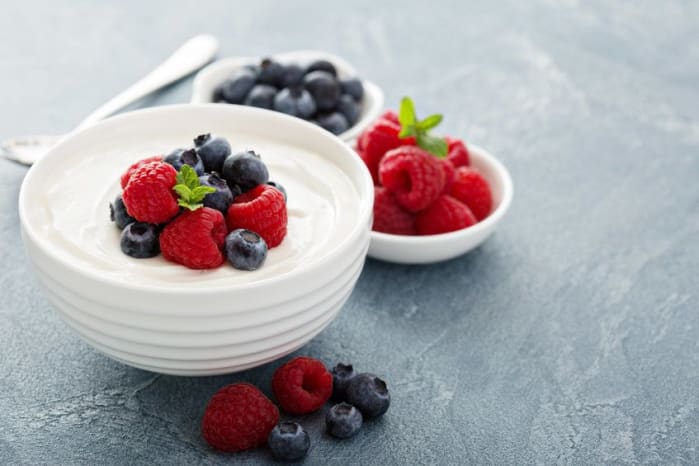Nutrition
We’ve all been there. There are those words: ‘Would you like to see the dessert menu?’, followed by that momentary pause as you wait to see who’s going to make the first move. As a sweet lover, I’m always astounded by those who are able to respond with a simple ‘No, I’m good thank you’, without the slightest hint of hesitation. Yet there are many reasons why some people find it easy to turn down sugary foods, whilst others can’t resist a sweet treat.
“When someone is craving sweet foods, often it is because the chocolate or sweet treat is doing something that an entire meal should be doing,” says registered nutritional therapist Paula Werrett, from the Institute for Optimum Nutrition. Sugar ‘addiction’, she adds, is also often linked to low mood, emotional eating, habits and stress.
The good news, however, is there are lots of practical steps we can take to tame a sweet tooth.

Focus on eating balanced meals
As a first step, Werrett recommends eating three balanced meals and at regular meal times throughout the day.
“Make sure you are including a source of good quality protein, healthy fats and lots of nutritious fibrous vegetables in each meal,” she says. “This can help to manage cravings by generating a steady source of fuel and by avoiding the energy peaks and troughs associated with high sugar foods.”
Good protein sources include fish, meat, eggs, nuts, seeds and pulses, whilst healthy fats can be found in olive oil, avocado, nuts, seeds or olives. Getting adequate amounts of vitamins and minerals is also important. Werrett says to think about magnesium in particular — found in leafy greens, nuts and seeds – because this is vital for energy production and is a common nutrient deficiency.
Read: How much sugar is in your food?
Eat more mindfully
Werrett also recommends chewing your food well and engaging with hunger and fullness mechanisms.
“For instance, consider whether you are mouth hungry (just fancying something) or stomach hungry (tummy rumbling),” she says.
For those sugar cravings that won’t go away, however, there are healthier ways in which to satisfy them. You could try adding sweeter tasting vegetables like pumpkin or sweet potato to meals, or ending a balanced meal with something naturally sweet such as fresh fruit and nuts, dark chocolate (with a cocoa content of 70%+) and a handful of berries, or Greek yoghurt with berries.

Make sure you get enough sleep
The quality and duration of our sleep is also important. This is because it has a big impact on our hormones the following day, including those that regulate hunger and food cravings. According to one study, just two consecutive nights of sleep deprivation (four hours per night) increased levels of ghrelin (the ‘hunger’ hormone) and self-reported hunger in normal weight, healthy men, and decreased levels of leptin (the ‘fullness’ hormone).
Try to aim for eight hours a night; going to bed and waking up at the same time each day to establish a sleep routine.
Don’t just rely on sweeteners
Whilst it can be difficult to suddenly cut out all sweet things, Werrett says that alternatives such as honey, syrups or dried fruits also shouldn’t be treated as a get out of jail free card.
“However, it is unrealistic to be able to just stop eating sweet snacks straight away,” she says. “You could try baking a batch of healthier biscuits – full of nuts and dates and a little maple syrup. Although they will not be sugar free, they will be higher in fibre and protein than a shop-bought alterative and can be on-hand if you really crave something sweet.”
Research has shown that artificial sweeteners, previously considered a healthier option than natural sugar, may also be linked to obesity and metabolic syndrome. Eating foods that contain artificial sweeteners has also been linked to reduced satiety as well as ‘rebound eating’; and so low-calorie, artificially sweetened options may encourage us to eat more overall.
If you’re concerned about blood sugars or insulin resistance, chocolate with a higher cocoa/cacao percentage and less sugar should have less impact on blood sugar. However, despite its benefits, chocolate should be eaten in moderation and ideally after a meal.
Take a long-term approach
Ultimately, says Werrett, curbing a sugar addiction requires a long-term approach. “It’s not going to work if you are in the middle of a 4pm sugar crash. But by implementing certain foods and strategies, you may find sugar cravings recede over time.”
A registered nutritional therapist can also help you to identify what’s causing your sugar cravings, and provide personalised recommendations and strategies to help you to manage them.
Find a registered nutritional therapist to work with at the Institute for Optimum Nutrition’s innovative clinic and find out about ION’s courses.






